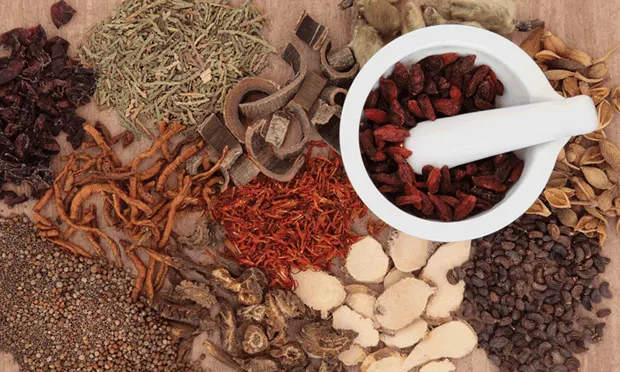Evidence-Based Chinese Herbal Medicine

History
Literature that supports Chinese herbal medicine in conjunction with or as an alternative to conventional veterinary treatment is lacking; however, relevant studies and increasing client demand have brought the issue to the forefront.
Related Article: Mixing It Up: Holistic & Traditional Veterinary Medicine
In China, herbal formulas have been administered to animals for thousands of years. There have been documented effects on various organ systems and oncologic processes.1,2 In 2002, 18.6% of American adults reported using some sort of Chinese herbal medicine, compared with 12.1% in 1997.3 Similarly, a study published in 2011 reported that 12 accredited veterinary schools in North America offered programs in complementary or alternative medicine, compared with 7 schools in 2000.4
Interests in improving treatment outcome and quality of life have contributed to the increased popularity of veterinary Chinese herbal formulas. Despite concerns about drug interactions, lack of supportive evidence-based research, and questions about formulas containing by-products from endangered species or other animals, evidence may exist for the recognition of this modality as a legitimate treatment option.
Clinical Trial
One prospective clinical trial of 14 cats with hyperthyroidism compared the efficacy of methimazole treatment to treatment with the Chinese herbal formula Hai Zao Yu Hu Tang over an 8-week period.5 Changes in heart rate, respiratory rate, general behavior, severity of polyuria/polydipsia, thirst, appetite, vomiting, aggressive behavior, quality of life, and serum total thyroxine (TT4) concentration were recorded.
The decrease in serum TT4 concentration was greater in the methimazole group but not significantly. Markedly greater improvements in clinical signs were documented for all other parameters evaluated in the herbal group when compared with the control group.5
Hai Zao Yu Hu TangHai Zao Yu Hu Tang, a Chinese herbal therapy used in humans and cats,6,7 includes 11 herbs that are formulated based on the principles of traditional Chinese medicine to treat the signs of hyperthyroidism. This formula also contains high levels of iodine, which blocks the action of increased serum T4 levels. Ingredients include:
Hai Zao (Sargassum)
Kun Bu (Laminaria)
Chen Pi (Citrus)
Qing Pi (Citrus)
Lian Qiao (Forsythia)
Bei Mu (Fritillaria)
Dang Gui (Angelica)
Chuan Xiong (Ligusticum)
Du Huo (Angelica)
Gan Cao (Glycyrrhiza)
Hai Dai (Zostera)

Case Studies
In a randomized, controlled trial of 19 horses with acute necrotic hepatitis, 12 were treated with the herbal medicine Yin Chen Hu Gan San and 7 were treated with glucuronolactone, glucose, and vitamin B1.8 After 5 days of treatment, jaundice resolved and results of liver function tests were within reference ranges in both groups. However, horses that received conventional treatment had residual weakness, decreased appetite, and increased undigested food in the feces compared with the horses in the herbal group.8 This suggests that Yin Chen Hu Gan San may be superior to conventional hepatitis treatment alone.
The true prevalence of Chinese herb usage in cancer treatment is unknown, but a study published in 2006 concluded that complementary and alternative therapies were commonplace in dogs and cats with cancer.10 Some antitumor properties of herbal formulas and extracts are well documented in mouse tumor models and cell cultures but warrant clinical studies.11
In 2011, 8 dogs with mammary neoplasia (confirmed via histologic examination) were treated with surgery and a proprietary blend of Chinese herbs in a prospective clinical trial. The herbal group had a significantly greater survival time (>678 days) than the group that underwent surgery and chemotherapy (231 days).12
Yun Zhi, a Chinese mushroom (ie, Coriolus versicolor), contains the bioactive agent polysaccharopeptide, which has shown antitumor activity in vitro and inhibits tumor growth with minimal toxicity.13
In a 2012 randomized, double-blind study, 15 dogs with splenic hemangiosarcoma were administered increasing dosages of Yun Zhi following splenectomy. Dogs were monitored for evidence of visceral or pulmonary metastasis. Median time to progression for the group receiving the highest dose of Yun Zhi was significantly longer than lower dosage groups and comparable with dogs undergoing splenectomy and traditional chemotherapy.13
Although many of these studies have inherent limitations (ie, small sample size, retrospective analysis, selection bias), the results warrant further investigation.
Yin Chen Hu Gan SanYin Chen Hu Gan San, a modification of the classical herbal formula Yin Chen Hao Tang, has been used in humans with hepatitis. Therapeutic effects are believed to be caused by an increase in bilirubin clearance by the liver via the constitutive androstane receptor and through expression of bilirubin glucuronyltransferase and other components of the bilirubin metabolism pathway.9 Ingredients include:
Yin Chen (Artemisia)
Huang Qi (Astragalus)
Zhi Zi (Gardenia)
Bai Zhu (Atractylodes)
Mai Ya (Hordeum)
Shan Zha (Crataegus)
Shen Qu (Massa Fermentata)
Zhi Qiao (Aurantium)
Da Huang (Rheum palmatum)
Yu Jin (Curcuma)
Chai Hu (Bupleurum)
Related Article: Adjunct Therapy for Liver Disease
Considerations
Concerns about adverse effects and drug interactions between Chinese herbs and conventional therapy are common hesitations when recommending treatment. Known toxicities have been documented, and guidelines for use and client education are available to prescribing veterinarians.1,14
Specific herbal formulas or extracts must be used in small quantities or not at all (based on FDA regulations), and herbal manufacturers and suppliers should be closely scrutinized before use. In addition, appropriate herbal extraction and processing techniques must be performed to eliminate heavy metals or toxins from these formulas.
Beyond the Basics
Currently, no regulations exist regarding the prescription of herbal medications. Veterinarians who are certified in or have completed coursework in Chinese herbology or traditional Chinese veterinary medicine would be appropriate consults.
Conclusion
Veterinarians prescribing Chinese herbs should be knowledgeable about these topics and forthcoming about an herbal supplier’s policies and techniques. When choosing an herbal formula, doctors of traditional Chinese veterinary medicine record physical examination findings and clinical signs to make a pattern diagnosis (see Bian Zheng) and design a treatment plan to treat the individual disease and the entire patient. An understanding of herbal interactions, appropriate drug substitutions, dosages, treatment duration, and correct pattern recognition is necessary to eliminate potential adverse effects.
Incompatible herbal formulas and incorrect pattern diagnoses frequently cause undesired adverse events. The ability of a referring veterinarian to recognize appropriately trained practitioners who can prescribe safe and warranted formulas can provide interested clients with dependable avenues for these additional treatment options.
Bian Zheng
Disease (disharmony) is recognized via clinical signs, history, and physical examination findings.
Individualized treatment addresses the entire patient, including behaviors and personality traits.
Patients with the same presenting signs may have different treatment recommendations based on varying pattern diagnoses.
KENDRA V. POPE, DVM, CVA, CVCH, CVFT, CVTP, practices acupuncture and traditional Chinese veterinary medicine at Veterinary Specialty and Emergency Center in Levittown, Pennsylvania. Her interests include integrative and comparative oncology and holistic therapies for the treatment of chronic disease. Dr. Pope completed her training in acupuncture, Chinese herbal medicine, food therapy, and Chinese massage (Tui-na) at the Chi Institute of Traditional Chinese Veterinary Medicine in Reddick, Florida, as well as a rotating small animal internship at University of Pennsylvania.